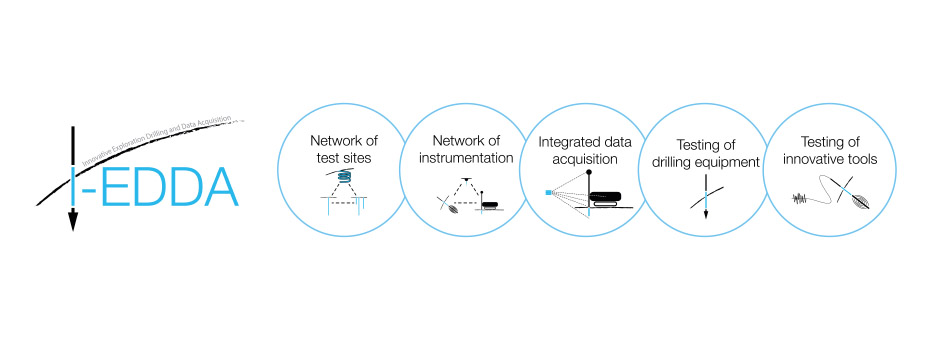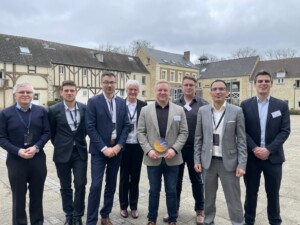I-EDDA: Innovative Exploration Drilling and Data Acquisition
As exploration goes deeper, drilling costs increase, so does the need to extract as much information as possible from each drilled meter. Innovation project I-EDDA aims to bring together drilling engineers and geoscientists to develop new on-site measurement technologies and drilling methods.
The I-EDDA network is partly built around the Swedish National Drilling Infrastructure in Riksriggen, Sweden operated by Lund University. It has a capacity to core drill to 2.5 km and is available to the scientific community. Through on-site testing of innovative core analysis methods, downhole logging and sampling technologies, environmental studies and drilling technology, exploration drillers and researchers will advance the state-of-the-art of exploration drilling and handling the data that the new analysis methods will generate. This will result in the drilled boreholes having a greater value for the exploration and mining companies and, as the data get integrated into the interpretation chain, the need for fewer boreholes.
I-EDDA Network of Infrastructures has actively been gathering scientists and academic researchers alongside industry partners, creating a comprehensive knowledge base and field expertise in Europe, benefiting from common interests in drilling-related issues and technologies, focusing on exchanging valuable insights and information.
Now, I-EDDA has developed from a successful network of researchers, academics and industry partners into new databases (I-EDDA TC) providing information on available instrumentation, serving as a coordination tool for the drilling community, and a new Research School I-EDDA-RS. Going forward, I-EDDA School will offer Master and PhD students education in methods for prospecting and drilling techniques. 20-40 students will participate in the initial year, starting in 2019. The collective know-how of researchers and industry is proof of what great coaction can achieve.
Large scale test center in collaboration with Epiroc, a leading partner for the mining and infrastructure industries
In January 2019, the I-EDDA test center project developed into large scale with Epiroc, outside Örebro, Sweden. With I-EDDA’s on-site testing of innovative core analysis methods, environmental studies combined with drilling technology, downhole logging and sampling technologies is included. This will result in need of fewer boreholes and significant value in every drilled hole providing integrated data for interpretation. The exchange of expertise and knowledge is mutually beneficial, providing exploration drillers and researchers with the assets of advanced state of the art techniques as well as handling the data generated from new analysis methods. The valuable benefit of extracting as much information as possible from every drilled meter, combined with increasing drilling costs as exploration goes deeper, is now leading the way towards a faster pace development of improved drilling technology.
Improved methods generating great value for the mining industry
The testing and development of new and existing methods partly built around the Swedish National Drilling Infrastructure ‘Riksriggen’ operated by Lund University have improved both techniques and equipment. So far, Riksriggen is generating greater value for the industry and scientists. Established during 2012, with first drilling started in 2013, in Sweden. The COSC-1 drilling hole reached a capacity to core drill to 2.5 km in 2014 and is available to the scientific community at cost.
I-EDDA Research School is supported by EIT RawMaterials. The financial contribution is used mainly for planning the research and its connection to field studies. I-EDDA Research School is ongoing from January 2019 until December 2021. The first year is dedicated to research, and in 2020 the school will welcome Master and PhD students.
Knowledge triangle integration elements in the provided services structure
I-EDDA connects scientists and academic researchers alongside industrial partners, creating a widespread knowledge base and field expertise in drilling technology and innovative core analysis methods in Scandinavia and Europe. The consortium skills are the key to this success story.
Without the support of EIT RawMaterials the two upcoming projects, I-EDDA-RS and I-EDDA-TC, would never have happened.
Christopher Juhlin, Uppsala University
Members of the innovation project I-EDDA consortium:
- Uppsala University, Sweden (Lead Partner)
- CBI Betonginstitutet AB, Sweden
- Epiroc Rock Drills AB, Sweden
- GTK (Geological Survey of Finland), Finland
- Helmholtz- Zentrum Potsdam Deutsches GeoForschungsZentrum (GFZ), Germany
- Luleå University of Technology (LTU), Sweden
- Lund University, Sweden
- Luossavaara-Kiirunavaara AB (LKAB), Sweden
- RISE Research Institutes of Sweden AB, Sweden
- Technische Universität Bergakademie Freiberg (TUBAF), Germany
For more information:





